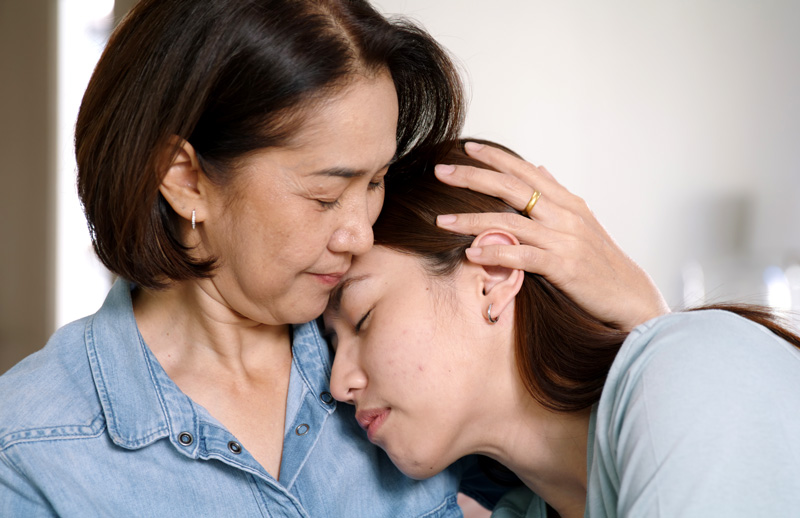When a family member experiences hazing, the recovery process often reverberates beyond the individual, particularly affecting parents. Parents frequently struggle with guilt, feelings of failure, and shame. This can shape family dynamics, influencing how they provide support—or fail to do so. Addressing parental guilt and encouraging accountability in a constructive manner is important to ensure an individual’s recovery but also the restoration of family harmony.

Parental guilt in hazing cases can stem from a variety of sources. Some parents blame themselves for not recognizing warning signs or for indirectly exposing their children to environments where hazing occurred. Others may question whether they failed to instill resilience or assertiveness in their child. In some cases, the guilt may be compounded by societal or cultural pressures to be the “perfect parent,” creating a cycle of criticism.
While guilt often leads to shame and inaction, accountability provides a healthier framework for parents to process their emotions. Accountability involves acknowledging feelings of failure without self-condemnation and instead channeling them into action. For example, parents might educate themselves about hazing, advocate for awareness programs, or seek family therapy to rebuild trust and communication.
Causes of parental reactions to bullying/hazing:
- Internalized Guilt and Shame
Many parents internalize their child’s experience as a personal failure, questioning their ability to protect or guide their child. This guilt can manifest as overcompensation, avoidance, or defensiveness. - Cultural Conditioning
Societal and cultural expectations often place undue pressure on parents to raise “strong,” “independent,” or “successful” children. When a hazing incident occurs, parents may fear that others will judge their parenting, which can lead to shame and reluctance to acknowledge the problem. - Generational Differences in Understanding Hazing
Parents who grew up in eras where hazing was normalized or dismissed as harmless may struggle to comprehend the seriousness of the trauma. This disconnect can result in minimizing their child’s experience or offering advice that feels invalidating. - Fear of Confrontation or Escalation
For some parents, the prospect of addressing hazing with schools or organizations feels overwhelming, especially in cases where the perpetrators hold power or influence. This fear can lead them to discourage their child from speaking out or taking action.
Parental guilt can create avoidance patterns. Parents may distance themselves from their children or use overprotective behaviors as compensation. Both can hinder open communication and emotional support. Parents may unconsciously project their guilt onto their children, blaming them for not seeking help sooner or participating in the hazing. This creates tension and further isolates the individual. Guilt can lead to role reversals where the individual recovering from hazing feels responsible for “comforting” or reassuring their parents.
Strategies for Accountability
- Acknowledgment Without Blame: Encourage parents to recognize their emotions and avoid blaming others.
- Proactive Education: Provide parents with resources about hazing and its psychological impact so that they can understand and support their child.
- Therapeutic Interventions: Family therapy sessions can address unresolved guilt and help establish supportive dynamics. Therapists can help parents frame their accountability in a positive light.
- Rebuilding Trust: Parents should commit to open communication, ensuring their child feels safe and heard during recovery. Simple affirmations like “I’m here for you” can make a huge difference.
When a child experiences hazing, parents often react in ways that reflect their own fears, past experiences, and cultural conditioning. These reactions can sometimes create barriers to open communication, making it difficult for children to seek support.
Accountability can be difficult for parents. Admitting that they might have overlooked warning signs or enabled certain environments requires parents to confront the truth. This creates a vulnerable position, making accountability a difficult emotional hurdle. Some parents focus on fixing the immediate problem, removing their child from the situation, or seeking a resolution for the perpetrators without addressing the emotional fallout within the family.
Why Is it Difficult for Children to Talk to Parents About Hazing?
- Fear of Judgment or Blame
Children may worry that their parents will blame them for “allowing” the hazing to occur or for not standing up for themselves. This fear is heightened if the parents have a history of expressing disappointment or holding rigid expectations. - Minimization of Experiences
If parents have previously downplayed the severity of their child’s challenges, the child may assume they’ll receive a similar reaction when discussing hazing. Phrases like “It’s not that bad” or “You’ll get over it” can create barriers to communication. - Shame and Embarrassment
Hazing often involves deeply personal or humiliating experiences. Children may feel too ashamed to share the details with their parents, fearing misunderstanding. - Protecting Parents from Pain
In some cases, children avoid discussing hazing to shield their parents from distress. They may sense their parents’ vulnerability or guilt and avoid adding to their emotional burden. - Power Dynamics in the Parent-Child Relationship
Traditional family hierarchies can discourage open dialogue. Children may feel their role is to obey or please their parents, not to confront them with complex emotional issues.
Parental reactions to hazing are influenced by personal and cultural factors, making accountability challenging.
Family norms and emotional communication patterns are ingrained and often occur below conscious awareness. These patterns influence how families respond to distressing events, including hazing. In the context of recovery, they can shape whether the individual feels supported or invalidated.
Implicit family norms are the unspoken rules and values that guide behavior. For some families, silence and avoidance dominate their interactions, creating a “don’t talk about problems” mindset. This tendency can prevent open discussions about the hazing experience, leaving the victim feeling isolated and unsupported. In families that prioritize external reputation, the need to preserve the family’s image may lead to minimizing the incident, which can undermine the victim’s feelings and discourage seeking help. Similarly, families emphasizing resilience or toughness may pressure the victim to “move on” quickly, stifling emotional processing and hindering recovery.
How emotions are communicated within the family also profoundly impacts the healing process. Families that encourage emotional expression and active listening create a safe space for victims to process their experiences. In contrast, dismissive responses such as “It’s not that bad” or “Everyone goes through it” can deepen the victim’s distress, making their pain feel unacknowledged or unimportant. When families avoid discussing emotionally charged topics altogether, the victim may feel unsupported and invalidated.
Recovery often benefits from practical interventions. Family therapy can uncover and address unhelpful norms or communication patterns. Educating families about the psychological toll of hazing can foster empathy and understanding while empowering victims to recognize and navigate unhelpful dynamics, enabling them to seek support elsewhere if needed. By addressing these family dynamics, families can transition from inadvertently hindering recovery to becoming key allies in the healing process.
Generational trauma and resilience add further complexity to hazing recovery. Families with histories of trauma—such as abuse, neglect, or oppression—may carry unresolved emotional patterns that influence their responses. For instance, unresolved trauma can heighten sensitivity, resulting in disproportionate reactions like excessive fear or anger that amplify the victim’s stress. Some families adopt avoidance as a survival mechanism, minimizing hazing with comments like, “We went through worse, and we turned out fine.” Others might unintentionally reinforce harmful norms, normalizing hazing as a rite of passage.
Conversely, families with histories of resilience often bring strengths that aid recovery. Hardship can allow heightened empathy, allowing these families to be more attuned to the victim’s emotional needs. They may also possess adaptive coping skills, such as open communication or reliance on external support networks. Framing the hazing experience as an opportunity for growth, resilient families may emphasize the development of self-awareness, boundaries, and strength.
Parenting styles play a pivotal role in family responses to hazing. Authoritarian parents who rely on strict authority may dismiss hazing as a lesson in discipline or hierarchy, alienating the victim. Permissive parents, on the other hand, may lack the structure and guidance needed to support recovery. The most supportive approach is authoritative parenting, which balances empathy with structure to create an environment where the victim feels understood and empowered to heal.
Intergenerational dynamics can either impede or promote recovery. Trauma histories may perpetuate harmful cycles as families unconsciously recreate hierarchical or abusive patterns. However, recognizing these patterns through therapy or education offers opportunities to break cycles of harm. Families that become aware of their intergenerational influences can intentionally draw on their strengths while addressing weaknesses, fostering healthier recovery processes.
Therapeutic interventions like family systems therapy or trauma-informed counseling can help families understand and reshape intergenerational dynamics. Educational resources on the psychological effects of hazing empower families to respond with greater sensitivity. By fostering open communication, problem-solving skills, and stronger bonds, families can collectively build resilience, transforming into crucial allies in the victim’s healing journey.
Vishwani’s opinions are her own and are for informational purposes only. They are not intended to diagnose, treat, or provide medical advice. Please consult a qualified healthcare professional for personalized medical care.
Vishwani Sahai-Siddiqui is a residency- and fellowship-trained psychiatrist, now a medical writer and editor, and the owner of The Cognitive Quill. For more information, please visit cognitivequill.com or email vishwanipsychmd@gmail.com.
Articles in This Series
- The Long-Term Psychological Effects of Hazing and How We Can Prevent Them
- The Mental Health Impact of Hazing on Bystanders
- Under the Influence – How Hazing Drives Substance Use Among Students
- What Makes a Bully? Can Hazing Culture Temporarily Warp Someone’s Moral Compass?
- Beyond the Locker Room: Unmasking Hazing in the Military, Workplaces, and Sports Teams
- Gender Perspectives on Hazing: Understanding Mental Health Outcomes
- Navigating the Digital Minefield: Cyberbullying, Catfishing and Vulnerability Among Neurodivergent Populations
- From Harm to Healing: How Family Dynamics Shape Hazing Recovery
References
Bowen, M. (1978). Family therapy in clinical practice. Jason Aronson.
Branson, C. E., Baetz, C. L., Horwitz, S. M., & Hoagwood, K. E. (2017). Trauma-informed care in mental health settings: A systematic review of current approaches. Social Work in Mental Health, 15(6), 622-642. https://doi.org/10.1080/15332985.2016.1221119
Felitti, V. J., Anda, R. F., Nordenberg, D., Williamson, D. F., Spitz, A. M., Edwards, V., & Marks, J. S. (1998). Relationship of childhood abuse and household dysfunction to many of the leading causes of death in adults: The Adverse Childhood Experiences (ACE) study. American Journal of Preventive Medicine, 14(4), 245–258. https://doi.org/10.1016/S0749-3797(98)00017-8
Fisher, S., Smith, A. L., & Andrews, J. R. (2020). Family dynamics and recovery from trauma: An overview of systemic approaches. Journal of Family Psychology, 34(3), 245–259. https://doi.org/10.1037/fam0000580
Garner, A. S., & Shonkoff, J. P. (2012). Early childhood adversity, toxic stress, and the role of the pediatrician: Translating developmental science into lifelong health. Pediatrics, 129(1), e224–e231. https://doi.org/10.1542/peds.2011-2662
Hughes, R., & Coakley, J. (2021). Sport, hazing, and family culture: Impacts on youth mental health. International Journal of Sport and Society, 12(2), 105–120. https://doi.org/10.18848/2152-7857/CGP/v12i02/105-120
Johnson, K. M. (2018). The Impact of Parental Guilt on Adolescent Mental Health Outcomes. Clinical Child Psychology Review, 21(3), 215–229.
National Association of Mental Health Professionals. (2019). Hazing, Trauma, and Recovery: A Guide for Families. Washington, D.C.: NAMHP Press.
Parker, L., & Santos, E. (2022). Understanding Guilt and Shame in Trauma Recovery: A Parental Perspective.Behavioral Health Quarterly, 45(1), 47–59.
Smith, J. L., & Brown, R. (2020). Family Systems and Trauma Recovery: Bridging the Gap in Support. Journal of Family Psychology, 34(2), 123–135. https://doi.org/10.1037/fam0000581
Van der Kolk, B. A. (2015). The body keeps the score: Brain, mind, and body in the healing of trauma. Viking Press.
Walker, A. R., & Lee, C. (2021). Breaking the Silence: Family Communication in the Wake of Trauma. New York: Harper Mental Health.
Walsh, F. (2016). Strengthening family resilience (3rd ed.). Guilford Press.
Williams, C., & Foa, E. B. (2019). Trauma-focused family interventions: Evidence and practice. Clinical Psychology Review, 69, 63-73. https://doi.org/10.1016/j.cpr.2018.06.007




